The awakening finds Langland in poor circumstances.
"In woollen clothes and wet-shod I went forth afterwards."
But he soon falls asleep again. In the new dream he observes the events of Palm Sunday and describes them in terms of a knightly conflict. The imagery is now different. It is not drawn from nature or the life of the poor but from the world of conflict and war. The challenger is one who;
"..similar to the Samaritan and like to Piers Plowman Came barefoot on an ass's back, bootless yet pricking. He had no spurs nor spear, but was sprightly in bearing, Like a squire speeding to the ceremony of knighthood."
The Dreamer asks Faith (who is still with him) what this is all about and who is going to joust in Jerusalem. He gets several lines of conventional Christian theology.
"This gentle Jesus will joust in Piers' armour, In his helm and harbergin, humana natura; And Christ be so concealed, for consummatus deus. This pricker is in plate-armour of Piers the Plowman, And no dart may daunt him, in deitate patris."
The events of the trial and crucifixion are all there in VPP but Langland amplifies some, and enlivens them with his direct language. One such is the dead man who has only a bit part in the gospels, appearing when darkness covered the earth.
"At that din the dead came from deep burial, And told why that tempest was so long raging. 'There is a bitter battle,' the dead body murmured, 'Life and Death in this darkness each despoil the other. No one can well discover who will have the mastery Till Sunday at sunrise,' - and sank again to burial."
After a while The Dreamer decides to find out what is happening in hell. The passages are not in all translations but have some fine imagery. They are also interesting because The Harrowing of Hell has been quietly discarded by modern Christian theology. He meets one woman;
"Walking on her way with her eyes toward hell,
Mercy was that maiden,mild and comely,
Beautiful in bearing and benign in speech,
Her sister, as she seemed, came softly walking,
Afar from the east with her face westward,
A wondrous woman; her name was Truth."
Langland here tackles the problem that has bothered theologians for centuries. How can God be merciful and righteous at the same time? Mercy in this passage says that she is off to hell to welcome all those poor folk who are going to be released. There are lines here in which romance is enhanced by the neatness of the alliteration.
"Patriarchs and prophets have preached often
How man shall save man through maids assistance.
That what was lost through a tree a tree shall recover
And Death deliver what death has vanquished."
Truth is quite aggressive towards her sister.
"Never believe that yonder light can lift them higher,
Nor have them out of hell! Hold your tongue, Mercy!
You tell but a trifle! I, Truth, know certainly
That he who is once in hell will never be rescued."
After a brief argument they both see that Patience and Righteousness are coming. Patience backs up Mercy, proposing to dance at the delivery "For Jesus jousted well and day is already dawning". Righteousness lines up with Truth, asking if Peace is drunk.
"Do you rave? Or have you drunk deeply?
Righteousness is convinced that;
"their pain shall be perpetual and no prayer help them. Let them chew as they chose. Chide we not, sisters, For the apple which they have eaten is hopeless sorrow,"
A character called Book then appears. For his identity one must look to the scholars, but he has fine lines, introducing the seige-warfare imagery running through the Harrowing of Hell. The action seems to take place outside the gates.
"For Jesus as a giant comes with an engine hither
To break and beat down all powers against him,
And to have out of hell whomsoever he pleases."
Truth shuts them all up because she realises that;
"A spirit speaks to hell and bids unspar the portal. A loud voice from that light cried to Lucifer boldly: Princes of this place, unpin and unlock it! For here cometh with his crown the king who is in glory'."
Langland then gives a superb description of political decision-making in besieged hell. Satan wants a mediaeval defence.
"Set the brimstone boiling; burn it and fling it
Hot upon the heads of all beneath the battlement!
Bring forth the winch-bows and the brazen cannon,
And shatter their shield-wall with shooting madly!
Lucifer has a different line, saying that Jesus does not have any right to the human souls in hell.
"For by right and by reason the wretches with us
Are mine, body and soul, both good and evil.
For he said it himself who is the sire of heaven,
That if Adam ate the apple all should perish,
And dwell with the devils; thus he threatened them,"
Satan counters by arguing that Lucifer got mankind by trickery. Satan says that Lucifer
"...in the semblance of a serpent spoke from the tree. You egged Eve to eat the apple And told her a tale with treachery and lying."
There are some other characters in hell (bit parts) and poor old Lucifer gets blamed for his failure.
"For your lies, Lucifer, we have lost our booty!
First we fell though you from high heaven;
For we believed your lies and all leapt forth with you.
Now for your last lie we have lost Adam
And all our lordship, I believe, on land and on water."
The internal argument ends when 'the Light' makes a final demand.
"Dukes of this dim place, quick, undo the portal, That Christ may come in, the King's Son of heaven."
To read how Christ deals with Satan, click on VICTORY. To get back to the beginning click on HOME.
SPRIGHTlY IN BEARING
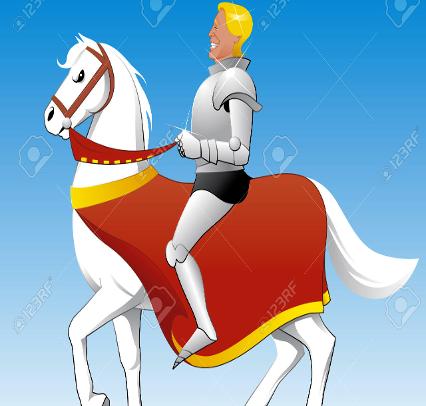
THE DEAD CAME FROM DEEP BURIAL
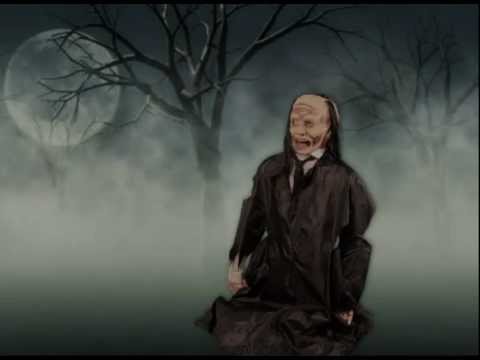
MERCY AND TRUTH MEET AND ARGUE
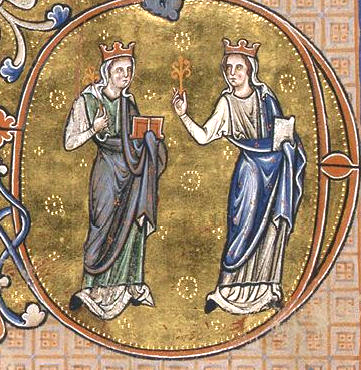
HAVE YOU DRUNK DEEPLY?
SCENE SET FOR ACTION. OUTSIDE GATES OF HELL
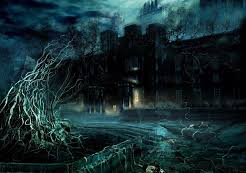
SEIGE ENGINE
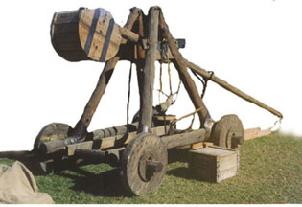
SET THE BRIMSTONE BOILING. BURN IT. FLING IT.
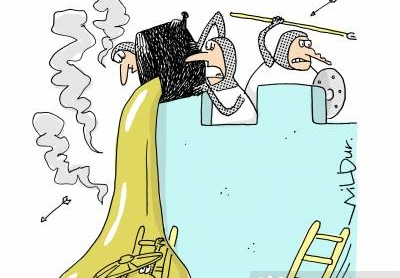
IN SEMBLANCE OF A SERPENT SPOKE FROM A TREE
